You are going to study but 3 minutes later you’re watching a video of dogs singing Christmas Carols: The importance of time and how to manage it
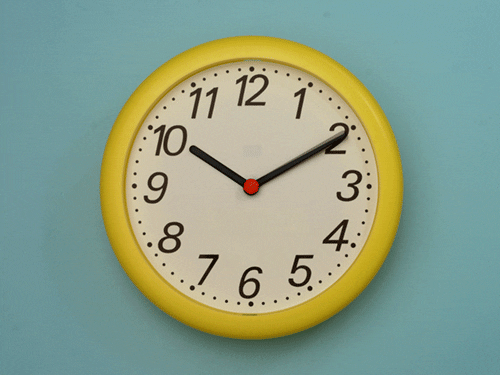
It’s that time of the year again – the final exams are just around the corner!
You know you REALLY need to read that compendium that had the amazing task of collecting dust all throughout this semester and now it is staring at you judgingly with its intrusive green covers.
So, you dust it off, pack your backpack, go to the CBS library and start prepping for the long and tedious study session that beckons you. You spend 30 minutes choosing your instrumental playlist, setting up your workspace and untangling your headphones (or for you AirPod users – wondering where in your bag you dropped your other AirPod).
After all of this, you finally sit down, concentrate…aaand 3 minutes later you’re watching a YouTube video of dogs singing Christmas Carols.

We’ve all been there.
So, how can we make sure that when we sit down to work, we actually do work instead of falling into a distraction rut?
To answer this question, I took inspiration from Cal Newport’s book “Deep work”. One of the highlights of his book is his productivity equation which looks like this:
High-Quality Work Produced = (Time Spent) x (Intensity of Focus).
Let’s break the equation down.
1. Time spent
Juggling a full-time study program here at CBS and having three jobs (one of them full-time) is definitely no easy task. I am frequently asked how I manage it and what my days look like. I always start with time.
We all have the same 24 hours. To have an actual idea of how much time we have to study and to schedule our study sessions correctly, we must first look at our calendars.
Personally, I am a big fan of calendar blocking. This is quite a well-known method that relates to time management and, in essence, gives you the ability to turn your tasks into time slots on your calendar. That will not only give you a better idea of how your day looks but also show you approximately how much time you allocate to different parts of your life.
The first step is to block all slots in a week that have been predetermined and that you cannot influence or alter easily i.e. lectures, working hours, sleep (!), etc. If you want to take it to the next level, you can also colour coordinate it, so that you can understand your day at a glance.
The second step is to add all your other appointments like workouts, leisure activities, chores around the house that you have to do, etc. (Pro tip: take transportation time into consideration and always give yourself a 15-minute buffer time).
After all of this is added, you will have the perfect idea of how much time you have left to allocate to your priorities.
2. Figuring out your priorities
When I am trying to figure out what is a priority and what can wait, I always resort to the Eisenhower Matrix. It looks something like this:
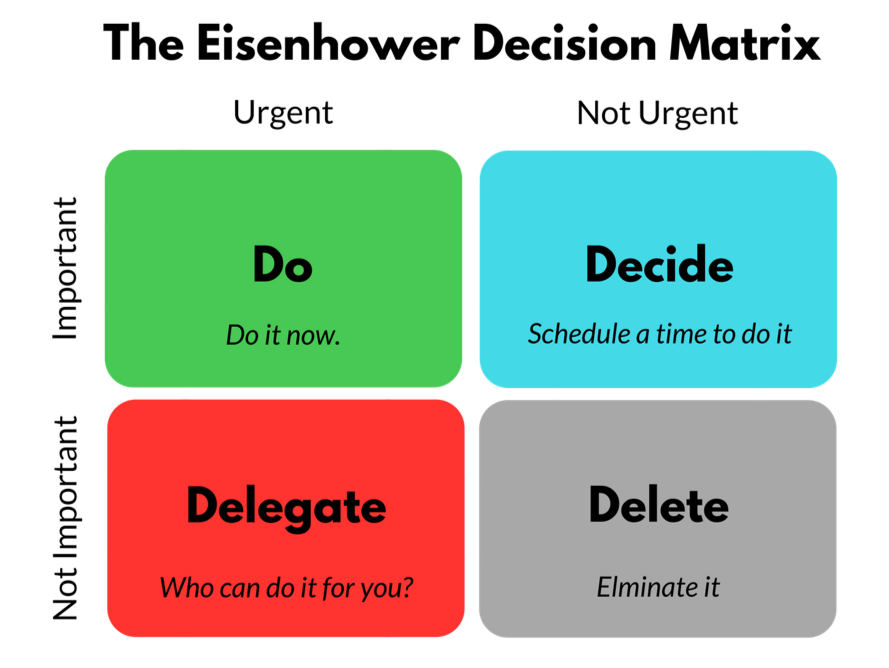
A question always arises here: “How do I know what is urgent or not and how urgent it is?” Easy peasy: Look at the deadline. If it has no deadline, then it shouldn’t be in the urgent tab.
For me, the urgency of a task is two-fold depending on whether I have started doing it or not. If I just have to finish a task, then the urgency is one week in advance of the deadline. If I haven’t started doing it, then the urgency starts at 3 weeks in advance. (Here, of course, I don’t take into consideration REALLY urgent tasks that just popped up and you need to sort them out this very second.)
Those are just the “magical numbers” that have worked for me but, depending on your attention span, you might need to expand or contract that time so that you can successfully allocate your focus. Speaking of…
3. Intensity of focus
In a perfect world, where you sleep at least 8 hours per day, attend all your lectures, exercise for the minimum recommended amount of 30 mins per day and go to your full-time/part-time job, include self-care, cooking and transportation, you wouldn’t be left with more than 5-9 hours per day (depending, of course, on your lifestyle). And I truly believe that you would like to make the most of them. Cal Newport gives us a hand here as well:
Narrow and strengthen
Your attention is a finite resource. Just like your energy and your time. Those are the three basic components you need to achieve your goals and fulfil your tasks. And yes, you’ve guessed it, they work best together.
What I mean to say is, choose a single target of focus. Multitasking sounds great on paper, but in reality, it drains your energy, rips your attention in multiple directions, as you desperately hope to save time.
But that saved time is meaningless if you don’t have the energy or the focus to enjoy it.
Focused work on a single target that you have chosen prior to starting your study session will help you concentrate and enter the realms of deep work. Deep work, as defined by Newport himself, is the ability to focus without distraction on a cognitively demanding task.
Keep your sessions sacred
When you have decided on the time and place of your study session, go there and immediately start doing the task itself. Do not check your e-mail, or your Amazon orders (guilty), just start with the task that you have envisioned for that day. What this will achieve is to kickstart momentum and get the ball rolling.
If you have to, download apps that limit your access to social media sites and order your coffee before you sit down at the table. Also, when you have entered the “deep work” realm, do not interrupt your sessions unless you feel like you are struggling to focus and that it takes immense amounts of energy to get back on track. Here the Pomodoro technique is not advivable.
( The Pomodoro Technique is a time management method developed by Francesco Cirillo in the late 1980s. The technique uses a timer to break down work into intervals, traditionally 25 minutes in length, separated by short 5-minute breaks.)
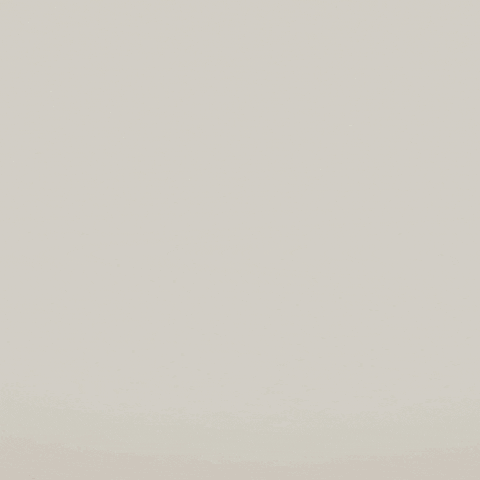
Sharpen your saw
We’ve all heard the story of the man who had to take a few minutes to sharpen his saw so that he can continue to chop trees at the same speed and with equal success. The same goes for your study sessions as well.
To make sure that you can start doing your work when you sit down, you have to also allocate time before or after your study session to take care of the tools that aid you in your work.
Update your digital calendar, clear your Desktop files, sort your tasks and reminders for the next day, book your study seat in the library in advance, arrange the pdf & word files that you will need for tomorrow and pack your snacks for the library 😉

Intense work ethic
An intense work ethic is a skill like every other and to develop it you need to practice. “Deep work” is not easy to achieve and your first couple of tries might not be successful. It all takes practice, discipline and commitment, but once you master it, you can halve the time that you need to study for exams and have enough time and energy to enjoy the few sunny days in Copenhagen.
Rest
Last but not least, I would like to mention rest. I have always been against anything radical because that shifts the balance and is never healthy. I am also really fond of the Swedish notion of “Lagom”. (Lagom is a Swedish term meaning “just about enough but not too much”). With that said, make sure you do mindless tasks. Yes, that’s right, go walk your dog, clean the dishes, do some tasks that do not require cognitive brain power so that you can relax and give your brain a rest.
In conclusion, structuring your day and having a good idea of what is ahead of you can really simplify your life and rid you of any unnecessary exam stress. Paying attention to what is important to you will make your path to success less bumpy. And allocating your energy right will make sure you don’t drown in coffee and energy drinks.
The “Deep work” method serves as crucial practice for building a mental framework that will allow you to apply your critical reasoning to any task you face. It makes you a flexible thinker. And that is a great skill to have.
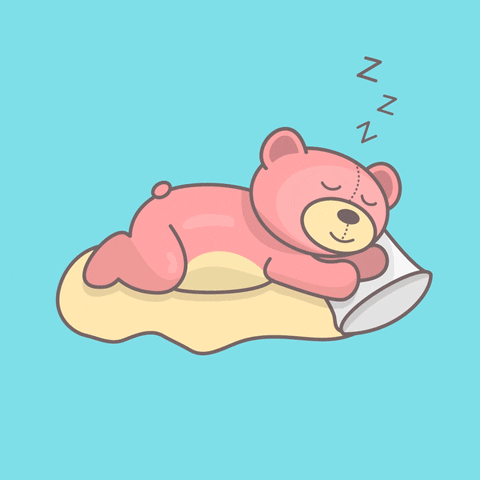





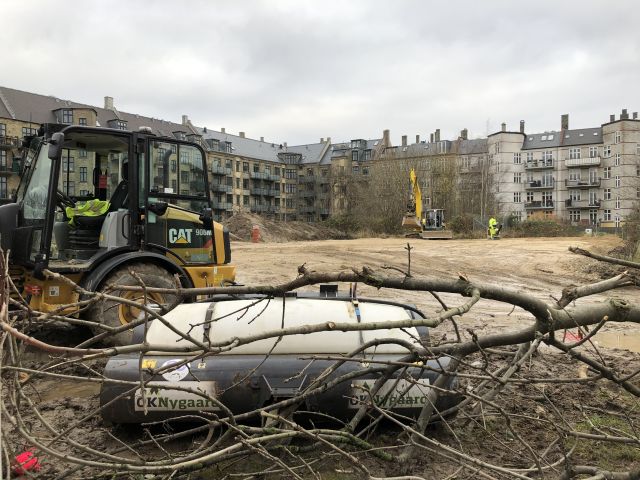






























































































































Comments